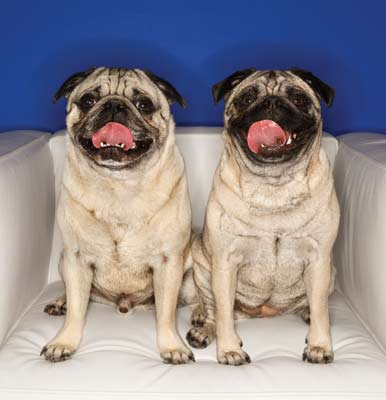Canine Cloning Is a Reality for Pet Owners
Seeing Double

For many pet owners, their four-leggeds are their children. Some will do almost anything for their pets. According to a recent article in Time, pet owners spent an astounding $36 billion on their critters in 2005. This is up from $17 billion just 10 years ago. So it should come as no surprise that earlier this month a woman named Bernann McKinney paid $50,000 to receive five cloned puppies from her late pit bull, Booger. She became the first customer of RNL Bio, a company from South Korea that claims it is the world’s first successful commercial canine cloning service.
McKinney’s reason having Booger cloned is touching. McKinney said she was especially attached to Booger because he saved her life when she was attacked by another dog three times his size. The attack resulted in her left hand being severely injured, and also damaged her leg nerves and stomach. Doctors later reconstructed her hand and she spent part of her recovery in a wheelchair. Booger was able to open her house door with his teeth and helped her take off her shoes and socks, even though she never trained him to do so.
Some critics accuse pet cloning proponents of encouraging prospective clients falsely to expect that their new pets will be indistinguishable from their old pets. What are the odds of one of McKinney’s cloned puppies having the same behavior as Booger? An animal clone has the same genes as its genetic donor, but behavior is influenced by environment and experience in addition to the genes. Therefore, the behavior of an animal clone and its genetic donor will be no more similar than the behavior of identical twins.
Cloning has been denounced by the Humane Society of the United States arguing that it is unethical for people to clone when so many homeless pets are in shelters. The organization goes so far as to say that the cloning of pets has no social value and in fact may lead to increased animal suffering. Other critics argue that cloning attempts have high rates of failure, that clones may have serious health problems in later life, and that pet cloning is a slippery slope to human cloning.
Proponents argue that cloning does not contribute to pet homelessness and the animals involved are treated humanely. Many feel cloning will contribute to scientific, veterinary, and medical knowledge and it will help efforts to preserve endangered cousins of the cat and dog.
I believe that the money spent on pet cloning would be better spent on spaying, neutering, and vaccinating the 6-8 million homeless animals that enter shelters each year. And adopting from a shelter rather than cloning your pet will help save one of the three million animals that are euthanized in shelters every year.
Cloning will not create an animal identical to the one who has passed on; it cannot replicate an animal’s individuality. A pet’s personality, the trait that most owners want to replicate, is the least likely to be replicated by cloning. An animal’s looks may be the only thing duplicated by cloning. The next time you buy your pet a new toy, ask yourself if you’re spending money on your pet because you like his looks, or because you like his personality.



